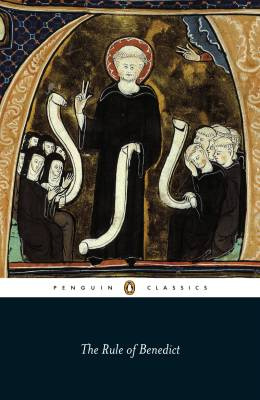THE RULE OF BENEDICT
Translated by
Carolinne White
BENEDICT OF NURSIA
Born c. 480, Nursia, Umbria
Died c. 545, the monastery of Monte Cassino
The Rule of St Benedict was written in Latin in around 540.
The text is taken from The Rule of Benedict,
Penguin Classics 2008.
BENEDICT OF NURSIA IN PENGUIN CLASSICS
The Rule of Benedict
Prologue
Listen, my son, to the masters instructions and take them to heart. These are the instructions of a loving father: receive them gladly and carry them out to good effect so that by the efforts of obedience you may return to him from whom you have withdrawn through the laziness of disobedience. It is to you that my words are now addressed, if you are ready to take up the powerful and glorious weapons of obedience, renouncing your own will with the intention of fighting for the true king, Christ the Lord.
First of all, every time you begin a good work you should pray to him with total commitment to bring it to perfection, so that he who has already been kind enough to count us as his sons will never be disappointed by our doing wrong. We must always obey him with the good things he has given us, so that he never disinherits his children like an angry father or becomes exasperated by our bad behaviour and hands us over to everlasting punishment as a terrifying master does with his delinquent servants, for refusing to follow him to glory.
Now at last we must wake up, as Scripture rouses us to do when it says, Now is the time for us to rise from sleep (Rom. 13:11). Let us open our eyes to the divine light and listen carefully to what the divine voice tells us to do when it cries out each day, If you hear his voice today, do not harden your hearts (Ps. 95:78), and also, He who has ears to hear, let him listen to what the spirit says to the churches (Rev. 2:7; see also, Matt. 11:15). And what does he say? Come to me, my children and listen to me; I will teach you the fear of the Lord (Ps. 34:11). Run, while you have the light of life, so that the darkness of death does not overtake you (John 12:35).
The Lord looks for his workman among the crowds of people, and repeatedly calls to him, Who is the man who desires life and who wishes to see good days? (Ps. 34:12). If you hear him and answer, I do, God will say to you, If you wish to have true and everlasting life, keep your tongue from speaking evil and your lips from speaking deceitfully. Turn away from evil and do good. Seek after peace and pursue it (Ps. 34:1314). And when you have done this, my eyes will be upon you and I will listen to your prayers. Even before you call on me, I will say to you, Here I am (Isa. 58:9). What can be sweeter to us, dear brothers, than the Lords voice when he invites us with these words? Look how the Lord in his loving kindness shows us the way of life.
And so, clothed in faith and the performance of good works, let us set off along his path using the Gospel as our guide, so that we may deserve to see him who has called us into his kingdom (1 Thess. 2:12). If we wish to live in the tabernacle of his kingdom, we will certainly only reach it if we run there by means of good works. But let us question the Lord in the words of the prophet, saying to him, Lord, who will live in your tabernacle or who will rest on your holy mountain? (Ps. 15:1). After putting this question, brothers, we must listen to the Lords reply for he points out to us the way to this tabernacle. He says, He who walks without blemish and who acts justly; he who speaks the truth in his heart and does not use his tongue to deceive; who does not harm his fellow man and does not listen to slander said about him (Ps. 15:23). This person has thwarted the devil in his wickedness by casting him and his suggestion away from the sight of his heart when the devil tries to persuade him to do something: he takes hold of the devils plans before they have time to mature and dashes them against Christ. Those who fear the Lord and do not allow themselves to become proud because of their good works realize that the good that is in them does not come from their own abilities but from the Lord. They praise the Lord working within them, repeating the words of the prophet, Not to us, Lord, not to us, but to your name give the glory (Ps. 115:1). In the same way the apostle Paul refused to claim any credit for the success of his preaching, saying, By the grace of God I am what I am (1 Cor. 15:10) and The person who boasts should boast in the Lord (2 Cor. 10:17). That is why the Lord, too, says in the Gospel, He who hears these words of mine and acts in accordance with them is like the wise man who built his house on the rock; the floods came, the winds blew and beat upon that house but it did not collapse for it was founded on rock (Matt. 7:245). Having made this pronouncement, the Lord every day expects that we should make our lives conform to this holy advice of his. And so the days of this life are lengthened and we are granted a truce during which to amend our bad ways, as the Apostle says, Do you not know that Gods patience is leading you to penitence? (Rom. 2:4). For the Lord in his kindness says, I do not want the death of a sinner but that he should be converted and live (Eze. 33:11). Brothers, we have questioned the Lord about the person who lives in his tabernacle, and we have heard his instructions about living there, but it is for us to fulfil the obligations of those who live there. And so we must prepare our hearts and bodies to fight by means of holy obedience to his instructions. If our natural abilities do not allow us to do something, we must ask the Lord to grant us his grace to assist us. If we wish to escape the punishments of hell and reach eternal life, we must hasten to do now what will profit us forever, while we still have time and while we are in this body and have the opportunity to fulfil all these things by the light of this life.
And so we intend to establish a school for the Lords service. In doing so we hope to demand nothing that is harsh, nothing oppressive. Even if, in order to maintain a balance, there are some slight restrictions aimed at the correction of errors and the preservation of love, you should not for that reason be frightened off and run away from the path of salvation, which has to be narrow at the beginning. As we make progress in our way of life and in faith, as our heart expands with the inexpressible sweetness of love, we shall run along the path of Gods commandments, never abandoning his guidance but persevering in his teaching within the monastery until death, so that we may have a share, through patience, in the sufferings of Christ and thereby also a share in his kingdom. Amen.
1
The kinds of monks
There are clearly four kinds of monks. First there are the coenobites; in other words, those who live in monasteries and do their service under a rule and an abbot. The second are the anchorites, that is, hermits: they are no longer in the first fervour of the monastic life, but have been trained by a lengthy period of probation in the monastery with the support of many others and have learned to fight against the devil. Well-armed, they go out from the ranks of the brothers to the single combat of the desert, without anyones support; relying on their own strength and with Gods help, they are able to fight against physical and mental temptations.














